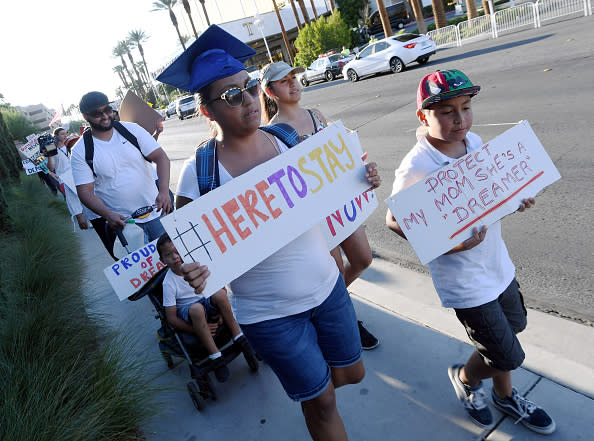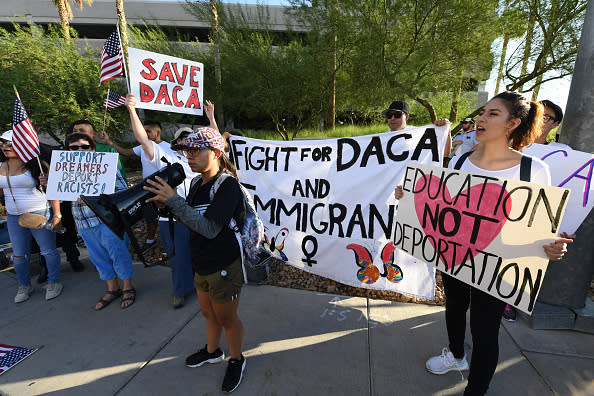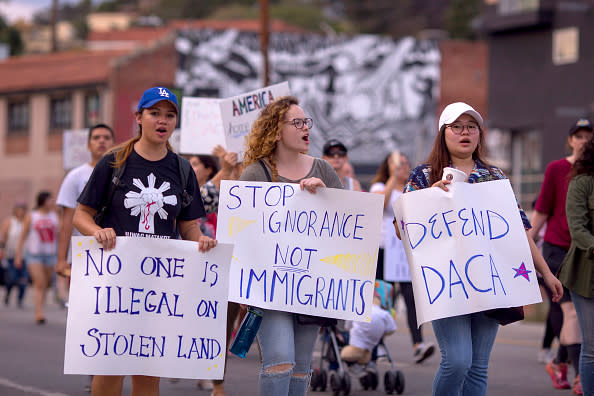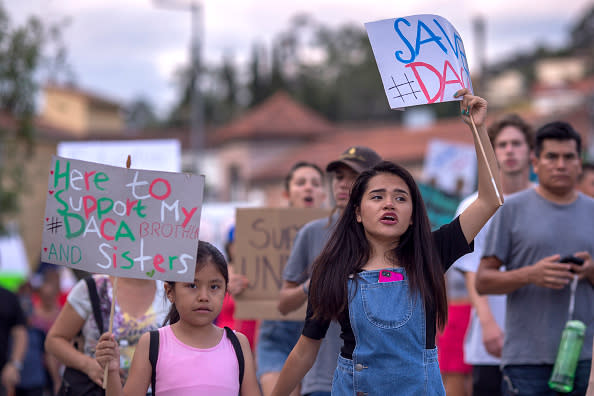Ni de aqui ni de alla: How it feels to lose DACA

“Ni de aqui ni de alla” is a phrase that many Latinx Dreamers and their families identify with. It translates to “Neither here, nor there.” We grow roots on both sides of the border, identifying with two countries and yet not truly fitting in either.
I came to the United States when I was only 4 years old. When I left Mexico, I didn’t understand that would be the last time I’d step foot in the country where I was born. I am 25 now, and I hope to one day travel back to Mexico freely and see my family still living there.
For more than two decades, my parents and I have waited to hear about the status of our immigration case — still nothing. The tragedy is that this silence is not rare; to the contrary, this is quite normal for undocumented immigrants.
My parents told me from a young age that my only job was to work hard in school. I saw how hard my parents worked, and I wanted to make them — and myself — proud. Neither of my parents have college degrees, and throughout my entire childhood, they encouraged me to pursue higher education. So, obviously, I was unbelievably thrilled when I got into my top university. I remember flaunting a sweatshirt from the college on the same day I got my acceptance letter, feeling proud, giddy, joyful.
Then, I remember my heart getting crushed as soon as I learned how much even one semester would cost me since I had to pay the out-of-state tuition rate.
It didn’t matter that I had been living here for most of my life. It didn’t matter what I had accomplished academically. What mattered was where I was born; what mattered was my immigration status.
I could have given up, I could have forgotten my academic goals — but I refused. I spent hours with my high school’s college counselor almost everyday because I was determined to go to college. I made myself at home in her office, and applied like a mad woman to any scholarship I was eligible for. (Dreamers are unable to receive any loans or grants.)
As my high school graduation approached, I still didn’t know how I would make it to college. I was anxious and heartbroken as I accepted that I would be left behind — until, one day, I was connected with a private university. My admissions counselor called me and said that, because of my GPA, I qualified for a $10,000 scholarship. Later, I found out that I would be eligible for more funding.
I will never forget my relief, my happiness. After so many nights spent crying, I finally felt like I was catching a break. Months later, I was moving into my campus dorm at a college in the state I had grown up in. I did it without taking any loans, as, again, undocumented youth do not qualify. This was far more then I could have ever hoped for.
Still, I was well aware that once I graduated college, I would have my degree — but no shot at a job. As an undocumented person, I didn’t have the authorization to work.
That all changed on one bright morning in 2012, when then-President Barack Obama announced the Deferred Action for Childhood Arrivals program, or DACA.
A flame of hope was sparked for thousands of Dreamers across the country as they came out of the shadows to apply, no longer hiding their undocumented status. After paying my fees and gathering copies of each document I needed, I applied during the program’s very first week. I was approved, and received my work permit in a few months. Next, I got a job as a student worker. I began to feel “normal.” I completed undergrad with two majors and a 3.99 GPA. I was the university’s student body vice-president.
A few months after I graduated from college, I was able to earn a job at my alma mater.
Two years after that, I achieved another dream of mine: I earned my MBA.
Things drastically changed on September 5th, 2017, when President Donald Trump announced that DACA would be rescinded.
My heart sank; I couldn’t speak. We were moving backwards, not forwards. DACA was not a permanent solution, by any means, for the struggles faced by undocumented immigrants — but it helped Dreamers provide for their families, buy homes, start businesses, and afford school. Our hopes have been shattered. President Trump is handing the torch to Congress to pass legislature that will “help” us, but uncertainty remains. We don’t know if and when they will act, or if they will act in a way that actually helps us.
What’s going to happen to thousands of DACA recipients once their DACA expires? Will we be deported? Will younger Dreamers be able to finish school?
Dreamers and their families, in my eyes, are the epitome of the American Dream. We shouldn’t be forced to wonder if our government will recognize our humanity.



